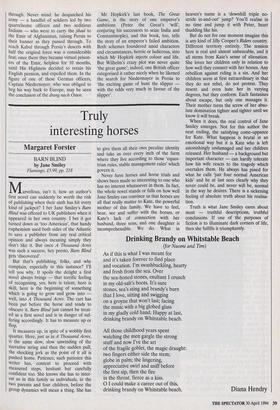Truly interesting horses
Margaret Forster
BARN BLIND by Jane Smiley Flamingo, £5.99, pp. 218 arvellous, isn't it, how an author's first novel can suddenly be worth the risk of publishing when their sixth has hit every kind of jackpot? I bet Jane Smiley's Barn Blind was offered to UK publishers when it appeared in her own country. I bet it got turned down as 'too American', that handy euphemism used both sides of the Atlantic to save a publisher from any real critical opinion and always meaning simply they don't like it. But once A Thousand Acres was such a success, hey presto, Barn Blind gets 'discovered'.
But that's publishing, folks, and why complain, especially in this instance? I'll tell you why. It spoils the delight a first novel always brings — that terrific feeling of recognising, yes, here is talent, here is skill, here is the beginning of something which is going to grow and grow into — well, into A Thousand Acres. The cart has been put before the horse and tends to obscure it. Barn Blind just cannot be treat- ed as a first novel and is in danger of suf- fering accordingly. It has to measure up or flop.
It measures up, in spite of a wobbly first quarter. Here, just as in A Thousand Acres, is the same slow, slow unwinding of the narrative string and then the sudden pull, the shocking jerk as the point of it all is pushed home. Patience, such patience this writer has, content to proceed with measured steps, hesitant but carefully confident too. She knows she has to inter- est us in this family as individuals, in the two parents and four children, before the group dynamics will mean a thing. She has to give them all their own peculiar identity and take us over every inch of the farm where they live according to those 'eques- trian rules, stable management rules' which govern it. Never have horses and horse trials and shows been made so interesting to one who has no interest whatsoever in them. In fact, the whole novel stands or falls on how well Jane Smiley can convince us that horses are all that really matter to Kate, the powerful mother of this family. We have to feel, hear, see and suffer with the horses, or Kate's lack of connection with her husband, three sons, and one daughter is incomprehensible. We do. What in heaven's name is a 'downhill triple no- stride in-and-out' jump? You'll realise in no time and jump it with Peter, heart thudding like his.
But do not for one moment imagine this is any kind of Jilly Cooper's Riders country. Different territory entirely. The tension here is real and almost unbearable, and it all stems from Kate's sense of alienation. She loves her children only in relation to how well they connect with her horses. Any rebellion against riding is a sin. And her children seem at first extraordinary in that they do not rebel, do not protest. They resent and even hate her in varying degrees, but they conform. Each fantasises about escape, but only one manages it. Their mother turns the screw of her abso- lute domination tighter and tighter until we know it will break.
When it does, the real control of Jane Smiley emerges. Not for this author the neat ending, the satisfying come-uppance for Kate. What happens is brutal in an emotional way but it is Kate who is left astonishingly undamaged and her children released. Her husband — a background but important character — can hardly tolerate how his wife reacts to the tragedy which overtakes them. He always has pined for what he calls 'just four normal American kids' and he at last sees clearly why they never could be, and never will be, normal in the way he desires. There is a sickening feeling of absolute truth about his realisa- tion.
Truth is what Jane Smiley cares about most — truthful descriptions, truthful conclusions. If one of the purposes of fiction is to illuminate dark corners of life, then she fulfills it triumphantly.


























































 Previous page
Previous page